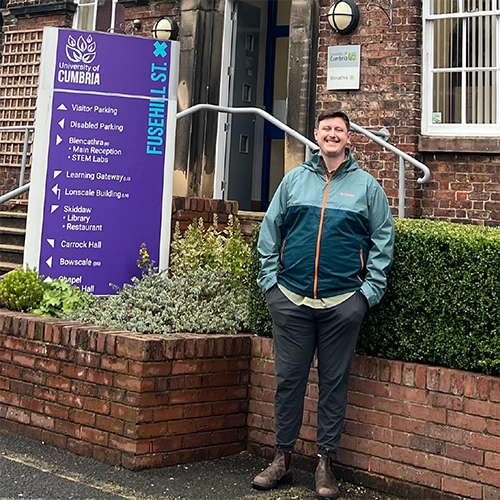

Billy is currently an MSC Occupational Therapy student from Canada. After several years as a community support worker, he chose to advance his education in occupational therapy. He completed his initial placement with the Neurorehabilitation team at Cumberland Infirmary, where he focused on assisting individuals in regaining their independence and returning home post-stroke or severe brain injury.
My name is Billy, and I’m from British Columbia on Canada's west coast. Playing football is the occupation that brings me the most joy, but I also enjoy walking, cooking, and participating in English traditions, such as attending a pub quiz with friends every Wednesday! I’m pursuing a Master's in Occupational Therapy at the University of Cumbria, and I’d like to share my experiences from the course and my first placement.
My Journey into Occupational Therapy
Like many Occupational Therapists, my journey into this profession was unconventional. I completed my bachelor’s degree in Kinesiology because I was interested in athletics and felt motivated by helping people. After graduation, I didn’t know exactly what I wanted to do, so I worked in a kitchen for several years before pursuing a job as a community support worker. In this role, I worked in a team to support individuals who had significant challenges in communication and mobility and required specific personal care support. I saw how professionals from different disciplines could collaborate to support the independence and growth of the individuals within my program. I was inspired by the impact of the occupational therapists I met, and that’s when I decided to pursue a career as an occupational therapist.
What I Love about Occupational Therapy
One of the things I appreciate about occupational therapy is how it uses your strengths and interests to shape your professional practice. A healthcare background isn't necessary if you are dedicated to helping individuals regain their independence and improve their quality of life. Occupational therapy has a remarkable ability to embrace the grey areas of life – the aspects that acknowledge human complexities and experiences, rather than focusing on conditions or diagnoses.
Specialising within Occupational Therapy
If you’re concerned about choosing a specialisation as an occupational therapist, I recommend staying open-minded and curious. The four placements will provide diverse experiences to help you determine your preferred career path after graduation. One of the great things about occupational therapy is that if you find a particular area isn't to your liking, you can explore other options until you discover a suitable fit.
Some things I Learned on my first placement within North Cumbria Integrated Care Trust on the Neuro-Rehab team at the Cumberland Infirmary:
- Confidence and techniques in building rapport with service users – Using Therapeutic use of self
- The tools utilised in a hospital environment evaluate physical abilities, cognitive skills, and particular tasks such as personal care and kitchen activities. For example, they assess how independently a person can get out of bed and manage their morning routine, which includes tasks like washing and dressing.
- How to apply OT theories in Acute clinical settings
- How to write accurate SOAP (Subjective, Objective, Assessment, Plan) notes
- Techniques for gathering information from service users, family members and medical notes to paint a picture of the individual before admittance to the hospital
- Adapting communication styles to meet service users’ needs
- Create occupational formulated goals with service users
What I’m proud of
The University of Cumbria provides many opportunities outside our studies and placements to get involved. As a student rep for my cohort, I enjoy ensuring that my cohort's voices are heard and that everyone is enjoying their experiences in their program. Within this role, I can help positively impact the program's direction and my classmates' experiences. As an RCOT Student Ambassador, I share my passion for OT with fellow and prospective students. I network with OT professionals and assist in recruiting students online. Being a member of RCOT offers benefits such as a platform for CPD, professional networking, professional indemnity cover up to 10 million, access to RCOT communities, and many others!
My future goals
When I graduate, my goal is to find a role where I can support Autistic children and adults in a community environment through sensory integration therapy and various other methods. I’m interested in helping them develop strategies and tools to cope with sensory overload and any other challenges they may have.
